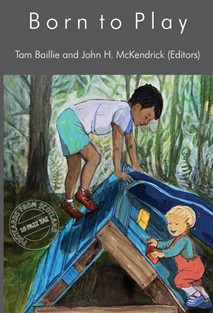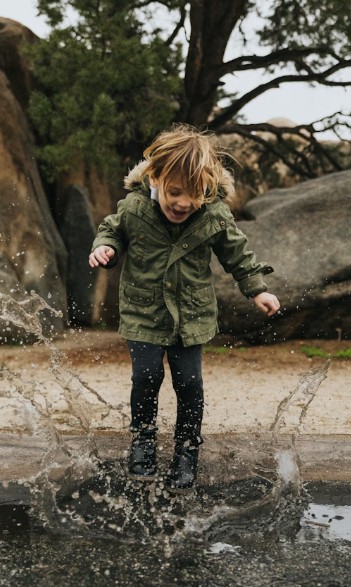 by Tam Baillie, former Children’s Commissioner for Scotland
by Tam Baillie, former Children’s Commissioner for Scotland
I’d describe myself as a ‘late developer’ when it comes to appreciating and understanding the role of play in children’s lives. I was always a believer in children learning through their own mistakes and comfortable with risk-taking behaviour. I enjoyed engaging in their fantasy worlds as I have plenty of silliness in my own make-up. Being playful with children was intuitive for me as a parent, as I think it is for most parents. But it took a long while for me to gain insight to the science of play, the fundamental cornerstone of children’s early development, and the crucial role that it plays. Here is an account of the distance I have travelled.
Did I hear you correctly?
In 1999, I was employed by Glasgow Alliance as a Project Manager, leading the Care-Leavers Partnership, known as The Big Step – that is, the ‘big step’ children had to make between being in care and then not being in care. Since they didn’t have family networks to fall back upon, they needed a wide range of supports as they navigated the transition into adulthood. The Big Step had a responsibility to improve the lives of children leaving care and a pot of money to initiate new projects which would achieve long-term goals. I was proud of the work we were doing, focussed on health, employment and accommodation. We were attracting local and national attention.
I was approached by Alan Rees, editor of a Scottish social work magazine, who wanted to do an article on the work of The Big Step. When he visited to prepare the article, our conversation was wide-ranging and touched on work Alan was involved in, including the International Play Association (IPA). I had to ask if I had heard him correctly. I’d spent my lifetime working with young people who had traumatic lives, including abuse, addictions, domestic violence and my last job involved more than four years of street work in Glasgow city centre where numerous young people didn’t survive into adulthood … and here was Alan telling me he did work promoting play for children across the globe! Play? I was taken aback and wondered when he would return to meaningful work with children and young people.
A gradual dawning
I didn’t give the work of Alan or the IPA a second thought because I was too busy getting on with what I considered serious work, not the frivolous indulgence of play. My tunnel vision in dealing with the here and now for vulnerable children was blinding me to the significance of early experiences on the children I worked with. My first awakening was whilst working with Barnados in the policy field. I began to realise the fundamental importance of early years experiences, and became familiar with and fascinated by what we know about early brain development.
it was a bit like returning to my university days studying psychology but this time I was focussed and hungry to learn as much as I could. It was easy for me to relate to the increased policy attention in providing the best during the early years and we had government policies like Sure Start that endorsed the direction of travel. When I moved on to be the Commissioner for Children and Young People in 2009, I was already primed to promote early years and was easily persuaded by advocates in the play world that I should lend them my support. The demands on the Commissioner’s role are immense in breadth, but I was drawn into numerous activities championing the role of play. If I am being honest, I had a rather superficial understanding of how play influenced children’s development and it took another stage for me to fully understand the real significance.
A light bulb moment
As the Commissioner I was frequently asked about the mental health and well-being of adolescents in Scotland as we have well documented ongoing concerns on this subject. The decline in adolescent mental health is an international phenomenon in the developed world. When asked to comment I referenced a range of links to: disrupted early attachment; the rise of social media; increased pressure from examinations; a lack of mental health support services (and now we can also cite the impact of the pandemic).
I wasn’t entirely satisfied with these explanations and it felt like something was missing for the universal nature of the concerns. It was only when I heard Peter Gray speak at a conference in 2017 that things fell into place. He listed the various factors impacting on children’s enjoyment of their right to play and made a direct link to mental health in adolescence. The contraction in roaming space for children in communities, the sanitising of risky elements of play and the restrictions on outdoor play … these all lead to a lack of inner resilience to cope with the stresses and strains of adolescence and contribute to poor mental health for our young people.
 Making up for lost time
Making up for lost time
My conference experience prompted in me a resolve that, whatever I did with my future, I would dedicate time to the promotion of play and the link with adolescent mental health – making up for the missed opportunities in my previous influential positions. The conference speech inspired me and I now have the privilege of being able to influence though Board membership of the International Play Association and Upstart Scotland. It just shows you that it is never too late for the penny to drop.
I have now co-edited a book called Born to Play and I comfortably use terms relating to children’s play like ‘irrepressible urge’ and ‘biological imperative’ while advocating that it is as important as food, water and shelter in nurturing development in children. However, my guess is that the lack of insight I demonstrated in Alan’s visit is still prevalent for many professionals. They’re doing what they consider more important work than play – and most likely, it isn’t.
[Header image by Jonny Gios for Unsplash]
You can buy Born To Play at postcardsfromscotland.co.uk


